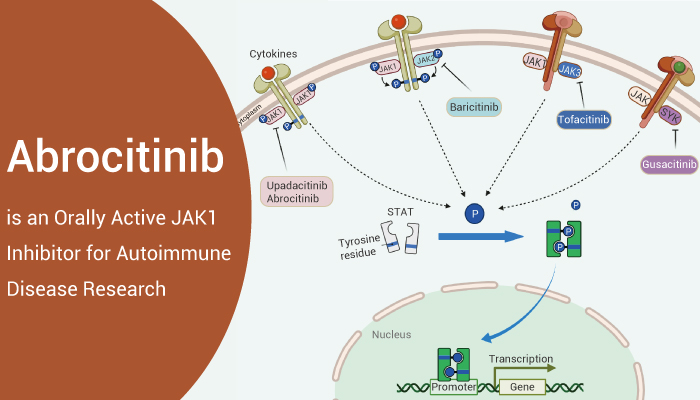Janus kinase (JAK) is a family of intracellular, non-receptor tyrosine kinases that transduce cytokine-mediated signals via the JAK-STAT pathway. JAK1 is a human tyrosine kinase protein essential for signaling for certain type I and type II cytokines. It interacts with the common gamma chain (γc) of type I cytokine receptors, to elicit signals from the IL-2 receptor family, the IL-4 receptor family, the gp130 receptor family. It is also important for transducing a signal by type I and type II interferons, and members of the IL-10 family via type II cytokine receptors. Jak1 plays a critical role in initiating responses to multiple major cytokine receptor families. Loss of JAK1 is lethal in neonatal mice, possibly due to difficulties suckling. Expression of JAK1 in cancer cells enables individual cells to contract, potentially allowing them to escape their tumor and metastasize to other parts of the body.

Abrocitinib is an Orally Active and Potent JAK1 Inhibitor
Abrocitinib (PF-04965842) is a potent, orally active and selective JAK1 inhibitor. And its IC50 values are 29 and 803 nM for JAK1 and JAK2, respectively. Abrocitinib (PF-04965842) exhibits less active effect on TYK2 with an IC50 value of 1.253 μM. And it inhibits phosphorylation of STAT1, STAT3 and STAT5 after stimulation. Effective in autoimmune disease.
IIn vitro, Abrocitinib inhibits IFNα-stimulated STAT3 phosphorylation in human whole blood (HWB) with an IC50 value of 189 nM. And it also inhibits IFN-stimulated STAT1 phosphorylation with an IC50 value of 163 nM. Morever, it inhibits pSTAT5 incorporated into CD34+ of HWB (JAK2) as well, with an IC50 value of 7.178 μM. And in Vivo, Abrocitinib (5, 15, 50 mg/kg, p.o., daily for 7 days) significantly reduces paw swelling in rat adjuvant-induced arthritis model.
In conclusion, Abrocitinib is an orally active and potent JAK1 inhibitor for autoimmune disease research.
Reference:
[1]. J Med Chem. 2018 Feb 8;61(3):1130-1152.